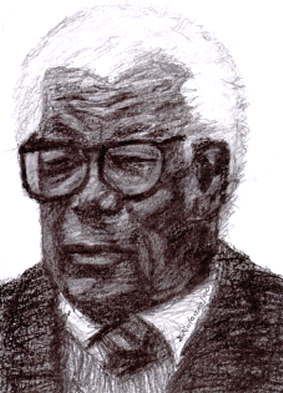This resource is hosted by the Nelson Mandela Foundation, but was compiled and authored by Padraig O’Malley. It is the product of almost two decades of research and includes analyses, chronologies, historical documents, and interviews from the apartheid and post-apartheid eras.
Walter Max Ulyate Sisulu
Walter Max Ulyate Sisulu was born in Engcobo in the Transkei on 18 May 1912, the year the ANC was founded. He became active in the political struggle in the 1930s. He rose to prominence in 1944, when he, together with Oliver Tambo, Nelson Mandela, Anton Lembede and others, founded the ANC Youth League. At the 1949 conference of the ANC the Youth League successfully proposed the adoption of the militant, mass-based Programme of Action. At this conference, Dr Alfred Xuma stood down as President and Reverend James Calata relinquished his post of Secretary General. Dr James Moroka was elected President and Sisulu Secretary General.
Sisulu, together with Yusuf Cachalia, served as joint secretary of the Defiance Campaign, which was launched in June 1952. He was first accused in the Defiance Campaign trial. He was guest of honour at the 1953 World Youth Festival in Bucharest. During this trip he visited Israel, the Soviet Union and the People's Republic of China. He was served with his first banning order in 1954. Despite these banning orders he was part of a group of leaders who clandestinely continued their political activities.
He was arrested for treason in 1956 and was among the 30 accused whose trial lasted until March 1961, when they were acquitted. He was placed under house arrest (first for 12 hours a day, and later for 24 hours a day) in October 1962. He was arrested and sentenced to six years imprisonment for continuation of ANC activities. He appealed against his sentence and, while out on bail, went underground. He was arrested at Rivonia on 11 July 1963 and sentenced to life imprisonment.
As part of the negotiations process initiated by Mandela from prison in 1986, Sisulu and other Rivonia trialists were released on 10 October 1989. Sisulu was elected Deputy President of the ANC in July 1991. He retired from official positions in the ANC.
The triumvirate of Mandela, Tambo and Sisulu is widely acknowledged for the formation of the ANC Youth League in 1944, steering South Africa towards democracy and bringing the ANC to power in 1994.

Walter Sisulu
by David Koloane
Profile
Ambition is an accepted part of the human psyche. Perhaps because politics is about power, there is the perception that all who engage in political activities have personalities dominated by personal ambition.
Walter Sisulu's life and personality run completely against any such stereotype. He and his wife, Albertina, individually and as a couple, enjoy veneration and warmth from South Africans today which is surpassed only by that accorded to Nelson Mandela.
His unwavering commitment to the struggle for freedom sits comfortably with an absence of personal ambition. He exudes an aura of calm, careful judgement, deliberation and empathy.
All of us in prison, irrespective of which political organisation we belonged to, always sought and gave the greatest weight to his opinion. One sought his counsel because one was secure in the knowledge that he never made a hasty conclusion or decision. This careful weighing, be it of situations or people, drew all, including intellectuals and professionals with high academic qualifications, to seeks his views.
When I left prison, Mandela and Sisulu had given me assignments that necessitated my going into exile. The tasks also required that I work with Oliver Tambo, the President of the ANC (known as 'O.R'), in close trust and confidence. I was concerned that O.R. may have reservations about this, given that I was a communist. I raised the matter with Mandela and Sisulu and asked their advice on how I should respond if O.R. were to ask me whether I was a communist. Mandela felt that I would not be asked such a question. Sisulu tended to go along with this view but came back to the issue the next day.
It was still his opinion that O.R. would not raise the issue, but added that if the question arose, I should without equivocation acknowledge that I was a communist. He maintained that this would be the only way I could hope to create a workable trust.
I was struck by the fact that he had gone to such lengths in weighing the issue. As it happened, O.R. never asked the question.
In our discussions and during the political classes we conducted among ourselves, Sisulu specialised on the history of the struggle and the ANC. There was a consistent thread in everything he said: We, as freedom fighters, had a fundamental obligation to the people, the masses. Whatever our differences and disagreements, he said, we must never mislead or divide the people. Our task must always be to unite the people.
On reflection, this is the core value that explains his personality and his greatness, which gives him a unique place in the history of South Africa.